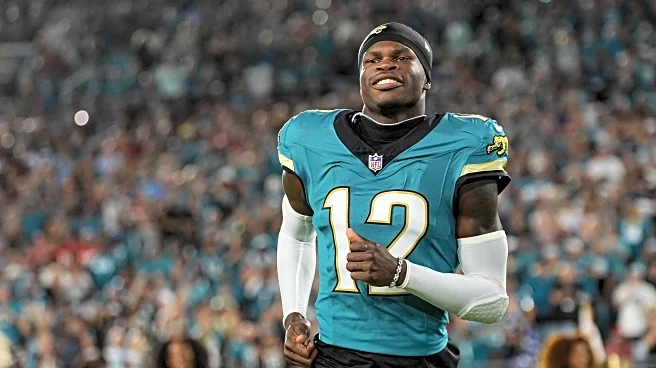What's Happening?
In early 2025, several significant events in reality TV have reshaped fan perceptions and industry practices. Scheana Shay's memoir revealed her husband's affair during her pregnancy, prompting a reevaluation
of privacy in Bravo's narratives. Taylor Frankie Paul was announced as the new Bachelorette, marking a shift in casting practices by selecting a lead outside the franchise's usual alumni pool. The ongoing impact of Tom Sandoval's affair continues to affect PR and show reboots. Brooks Nader's cheating allegations against an ex coincided with her new show's trailer release, raising ethical questions about promotional strategies. Additionally, the breakup of a Love Island USA couple has fueled social media debates and extended the show's reach beyond traditional broadcasts.
Why It's Important?
These developments highlight a shift in reality TV towards more sensational and cross-platform content. The casting of Taylor Frankie Paul as the Bachelorette suggests a trend towards leveraging viral fame for higher viewership, potentially altering franchise formats. Scheana Shay's memoir and Brooks Nader's allegations illustrate how personal narratives are increasingly used as promotional tools, raising ethical concerns about authenticity and audience manipulation. The continued fallout from Tom Sandoval's affair underscores the long-term impact of scandals on brand reputation and audience engagement. These events suggest that reality TV producers and advertisers must navigate faster backlash and evolving viewer expectations.
What's Next?
The reality TV industry may see more cross-platform casting and monetized confessions, with reunion specials designed to trend rather than resolve conflicts. Producers might increasingly view viral fame as casting currency, while advertisers face challenges in managing rapid audience reactions. Fans will play a more active role as judges and amplifiers of viral content, influencing the direction of reality TV narratives. The industry will need to balance ethical storytelling with the demand for sensational content to maintain viewer trust and engagement.
Beyond the Headlines
These reality TV shocks could lead to broader discussions about the ethical implications of using personal stories for entertainment and profit. The trend towards sensationalism may impact cultural perceptions of privacy and authenticity, as viewers become more critical of the narratives presented. Long-term, this could influence how reality TV is produced and consumed, with potential shifts towards more transparent and responsible storytelling practices.










